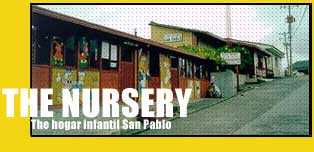 |
 |
|
The Hogar Infantil san Pablo, a nursery for 480 children from birth to seven years of age, meets the needs of a particularly disadvantaged population in an area of Popayan, in the south of Colombia. It provides three main services: school education, nutritional support through food aid and medical checks. It also acts as a community focus to improve social conditions and seeks to reach adults.
Considerable difficulties put the project at risk
although it is soundly financed, with a 20% contribution from the
Bienestar Familial institute, the official Colombian health organisation.
Today, the children are divided by age: - In Salacerna: 50 babies aged from birth
to one year. - In Caminadores: 100 children aged from
1 to 3 years. - In Escuela: 200 children aged from 3 to
7 years. The adults are also involved in the work of the nursery with monthly meetings, the 'Charlas' leading to presentations, followed by discussions prepared by doctors, psychologists, sociologists, or lawyers on the various problems in the daily lives of the families and of the area.
|
There are two medical consulting rooms, an emergency room, a dental surgery, a pharmacy and a small laboratory. A secretary and a nurse work full time and five doctors (two general practitioners, one gynaecologist, one paediatrician, one ear, nose and throat) and three dentists work by turns. The centre allows preventative treatment through regular medical checks, treatment of growth problems and treating infections in children with additional responsibility for medical problems in adults. Keeping proper medical records allows systematic
follow-up. The centre regularly welcomes doctors, psychologists
and nurses from overseas offering their services for periods of
a few weeks to such a delightful people.
- A director at $US 250 per month This totals 25 persons at $US4570 per month. This means an operating budget of around $US9570 per month ($US1.15 per child per day, say 7FRF or 1 Euro approximately). The Bienestar Familial institute contributes to the food budget each month, amounting to about 21% of the total operating budget. As for the remaining $US7570, Margarita can only count on donations from Canada, France and Finland and the modest parental contribution of up to $US75 per month. The most disadvantaged pay according to their means or not at all. A bakery is under construction next to the nursery
to bring in some additional income, but it will not be enough to
meet the operating budget.
|



